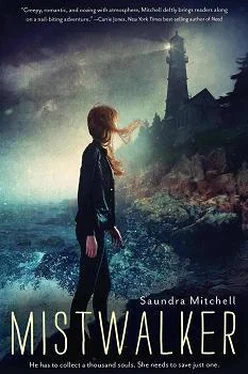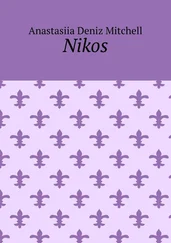These are lies. Sometimes I repeat them. It makes the hours, one after the other, same as the last, same as the next, go by. And now, my reward is at hand. My release. My freedom, and though in those early days I swore I would be better, I swore I would never press a cursed kiss on anyone the way Susannah had pressed one on me—
I realized, I had meant it only halfway. Because there, on the shore, she’s thinking of me. If she’ll only come, I’ll press this curse on her without hesitation. I’ll do it with the truth. With revelation. She’ll see every sweet benefit, and it’s no concern to me if she discovers the disadvantages. By then, it will be much too late.
And besides. She’ll need that discovery to fuel the first ten years. After that, she’ll manage on her own.
The next day, Seth waited for me on the main stairs.
Light filtered through the stained-glass window on the upper landing, blues and greens and golds that wavered like water. The colors played through Seth’s hair and reflected on his skin. He was built too rough and angular to call beautiful, but there was a reason girls craned out their car windows to get a look at him when we went to Bangor.
His smile bloomed when he saw me. Dumping his cracked paperback into his satchel, he hooked an arm around my waist and greeted me with a kiss. He pulled back, brushing his rough lips against my temple, and asked, “How’s Dad?”
“Feeling like a dumbass,” I said. “He says he wants to go back out as soon as he can.”
Without hesitation, he nodded. “I can miss school, no problem.”
He was so earnest. So damned earnest, thinking he was helping me. Like I was avoiding the boat on purpose. “I don’t want him to go out. How did he even get hurt last time? He wasn’t paying attention, and that’s dangerous.”
“I know, Willa. But he can’t stay ashore forever,” Seth said.
“Well, yeah.”
With another kiss against my temple, he said, “I could get Nick to pull the traps with me so Dad wouldn’t have to go.”
That was Seth’s best friend, a lumbering, shaggy guy who practically lived at Seth’s house. I liked Nick; everybody did. But his family was from Indiana, and he’d be hard-pressed to tell the difference between a lobster trap and a beehive.
So I was nastier than I meant to be when I asked, “Oh yeah? Does Nick even have a license?”
“It’s for one day.”
“That makes a big difference to the Marine Patrol.”
He stiffened a little, his hand going cold and heavy on my shoulder. Ducking beneath his arm, I walked a few steps ahead. I was afraid he’d spill into the hollow inside me. His hurt wouldn’t fill me up; it would drown me. “It’s all right. I’m gonna cut out for the flats; tell Bailey, all right?”
“You need a ride?”
His expression smoothed; watered light rippled across his face. A streak of green illuminated his eyes, then danced away to leave them dark. He meant it when he offered to drive me, but I shook my head anyway. I just wanted to get away, from him, from myself, I didn’t even know. From my life in all the after.
Seth lowered his voice. “I’m here, Willa.”
It should have made me happy that he could read me. That he knew me like that. But I didn’t want to give him credit for growing up with me. For being good; for being the one who knew where we were supposed to be going. It was easy to be angry with him, at him.
I said, “I’m fine. Tell Bailey.”
A couple of people wound past us, an embarrassing reminder that we weren’t having this nothing fight someplace dramatic and quiet. I guess it was good that people like us didn’t have to scream. Seth pressed his lips together, then waved a hand toward the door. The gesture said he’d tell Bailey; it invited me to go.
“Don’t you let Nick on my boat,” I replied, and let myself outside.
People talk about crisp autumn days, and maybe if I’d hiked into the woods, I might have enjoyed one. The colors had started to come in, copper ornament between firs and pines. Worn paths revealed bare stone beneath the soil and seeds, smooth from centuries of hikers.
But it wasn’t the woods for me. I walked home in a damp, clasping cold to get my worming gear. Then I followed the shore to one of the inlet flats.
The fog had thinned, but in places it lingered. It snaked across the grey mud, stirring around my ankles.
Late for low tide, I had to slog almost to the water to claim an untouched spot. The air smelled like fish and seaweed and the bloody waft of new-turned mud. I had my rake in hand, but instead of bending to get to work, I turned to consider Jackson’s Rock.
It looked like a cairn: a pile of granite boulders weathered to orange, capped with a thick head of jack pines. Mostly, it wore dark evergreens. Right at the point, though, a single, skeletal hemlock kept watch over the water.
Jutting above that, a sturdy, plaster white column cut the sky—our lighthouse. Even in daylight, it flashed a red light every nine seconds, calling souls and sailors home.
But there was no one there. The foghorn moaned when a computer told it to. The light pulsed by remote control. And my head ached when I tried to picture the east side of the island, the only place the cliffs collapsed to a shore. It was like Jackson’s Rock wanted to be forgotten.
I bent over to get to work, raking mud, wrestling worms into my bucket before they bit or escaped. My rake gasped through the mire, and the cold became a constant. Its own ache, one that usually scrubbed away thoughts and worries. But today, the lighthouse distracted me.
No, it was the fog.
Maybe it was both. They’d always been there, and I never thought about them. It woulda been like thinking about my own hip, or my middle toe. Some things were just there. Some things just were.
Still, it seemed to me like I knew a hundred reasons why nobody went to Jackson’s Rock. No shoreline to land on. Couldn’t get a boat past the shoals anyway. It was a nature preserve for nesting peregrines. It was infested with bats; it was dangerous to breathe all their dried crap. It was haunted. It was dangerous. There was nobody in the lighthouse. There was nobody in the lighthouse.
A fine wire of pain pierced through my head, but it didn’t stop me from thinking it. From feeling it. Maybe knowing it:
There was somebody in the lighthouse.
Cloudless skies came with morning and brought a sea barely rippled by the wind. I ate breakfast alone and dressed for school. Every time I caught a look outside, I hesitated. Our sugar maple had turned, half scarlet, half gold, and it seemed to sparkle in the pure light.
A transparent sunrise promised good weather all day, and I groaned when I stepped onto our porch. It was just cool enough to taste clean. No freeze in the wind to sneak into open collars or down the front of spray-soaked oil clothes.
The quiet pressed around me. Our fleet was nothing but shadows on the horizon, all set sail before first light.
I turned away. I had school. I told myself that like I really cared about it. Like it should grieve me to miss it.
Making my way toward the overlook hill, I felt the Jenn-a-Lo behind me. She didn’t care that I was banned from her deck. She needed the sea; she wanted to cut across the waves to our fishing grounds.
Halfway up the hill to school, I looked back. All along the asphalt roads, a twine of roofs made up our town. Strung like Christmas lights, they draped city limits from one end to the other. Pines swayed between them, and a white steeple signaled due east.
Just then, some of the little kids from town ran past. They held hands, a bright, giggling wall that swept me from the path. I stood in the soft, fallen needles, my back to the school. From that vantage, everything looked sharper, Broken Tooth revealed.
Читать дальше












